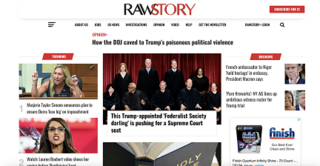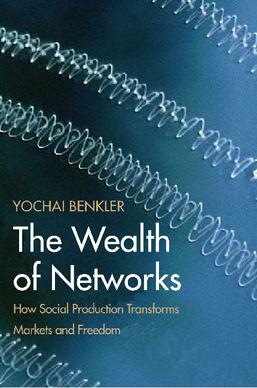
The Fox News Channel (FNC), commonly known as Fox News, is an American multinational conservative news and political commentary television channel and website based in New York City. It is owned by Fox News Media, which itself is owned by the Fox Corporation. It is the most-watched cable news network in the U.S., and as of 2023 it generates approximately 70% of its parent company's pre-tax profit. The channel broadcasts primarily from studios at 1211 Avenue of the Americas in Midtown Manhattan. Fox News provides a service to 86 countries and territories, with international broadcasts featuring Fox Extra segments during advertising breaks.
Disinformation is misleading content deliberately spread to deceive people, or to secure economic or political gain and which may cause public harm. Disinformation is an orchestrated adversarial activity in which actors employ strategic deceptions and media manipulation tactics to advance political, military, or commercial goals. Disinformation is implemented through attacks that "weaponize multiple rhetorical strategies and forms of knowing—including not only falsehoods but also truths, half-truths, and value judgements—to exploit and amplify culture wars and other identity-driven controversies."

Yochai Benkler is an Israeli-American author and the Berkman Professor of Entrepreneurial Legal Studies at Harvard Law School. He is also a faculty co-director of the Berkman Klein Center for Internet & Society at Harvard University. In academia he is best known for coining the term commons-based peer production and his widely cited 2006 book The Wealth of Networks.
Claims of media bias in the United States generally focus on the idea of media outlets reporting news in a way that seems partisan. Other claims argue that outlets sometimes sacrifice objectivity in pursuit of growth or profits.

Raw Story is an American progressive news website. Its reporting is a combination of syndicated articles, aggregated material, and its own independent reporting. With its focus on "news that's downplayed by mainstream media outlets", Raw Story often scoops major news media and has received several awards for its investigative journalism on topics such as domestic extremism, congressional conflicts-of-interest, and violence against US postal carriers. The organization was founded in 2004 by John K. Byrne and is owned by Byrne and Michael Rogers.
A private intelligence agency (PIA) is a private sector (non-governmental) or quasi-non-government organization devoted to the collection, analysis, and exploitation of information, through the evaluation of public sources and cooperation with other institutions. Some private intelligence agencies obtain information deceptively or through on-the-ground activities for clients.

The Wealth of Networks: How Social Production Transforms Markets and Freedom is a book by Harvard Law School professor Yochai Benkler published by Yale University Press on April 3, 2006. The book has been recognized as one of the most influential works of its time concerning the rise and impact of the Internet on the society, particularly in the sphere of economics. It also helped popularize the term Benkler coined few years earlier, the commons-based peer production (CBPP).
The Daily Caller is a right-wing news and opinion website based in Washington, D.C. It was founded by political commentator Tucker Carlson and political advisor Neil Patel in 2010. Launched as a "conservative answer to The Huffington Post", The Daily Caller quadrupled its audience and became profitable by 2012, surpassing several rival websites by 2013. In 2020, the site was described by The New York Times as having been "a pioneer in online conservative journalism". The Daily Caller is a member of the White House press pool.
One America News Network (OANN), also known as One America News (OAN), is a far-right, pro-Trump cable channel founded by Robert Herring Sr. and owned by Herring Networks, Inc., that launched on July 4, 2013. The network is headquartered in San Diego, California, and operates news bureaus in Washington, D.C., and New York City.
State-sponsored Internet propaganda is Internet manipulation and propaganda that is sponsored by a state. States have used the Internet, particularly social media to influence elections, sow distrust in institutions, spread rumors, spread disinformation, typically using bots to create and spread contact. Propaganda is used internally to control populations, and externally to influence other societies.

The Government Accountability Institute (GAI) is a conservative think tank located in Tallahassee, Florida. GAI was founded in 2012 by Peter Schweizer and Steve Bannon with funding from Robert Mercer and family. Schweizer serves as the group's president.

John F. Solomon is an American journalist who was a contributor to Fox News until late 2020. He was formerly an executive and editor-in-chief at The Washington Times.
Internet manipulation is the co-optation of online digital technologies, including algorithms, social bots, and automated scripts, for commercial, social, military, or political purposes. Internet and social media manipulation are the prime vehicles for spreading disinformation due to the importance of digital platforms for media consumption and everyday communication. When employed for political purposes, internet manipulation may be used to steer public opinion, polarise citizens, circulate conspiracy theories, and silence political dissidents. Internet manipulation can also be done for profit, for instance, to harm corporate or political adversaries and improve brand reputation. Internet manipulation is sometimes also used to describe the selective enforcement of Internet censorship or selective violations of net neutrality.

The Palmer Report is an American liberal fake news website, founded in 2016 by Bill Palmer. It is known for making unsubstantiated or false claims, producing hyperpartisan content, and publishing conspiracy theories, especially on matters relating to Donald Trump and Russia. Fact-checkers have debunked numerous Palmer Report stories, and organizations including the Columbia Journalism Review and the German Marshall Fund have listed the site among false content producers or biased websites.

Occupy Democrats is an American left-wing media outlet built around a Facebook page and corresponding website. Established in 2012, it publishes hyperpartisan content, clickbait, and false information. In 2017, posts originating from the Occupy Democrats Facebook page were among the most widely shared political content on Facebook.

The Uranium One controversy involves various conspiracy theories promoted by conservative media, politicians, and commentators that characterized the sale of the uranium mining company Uranium One to the Russian state-owned corporation Rosatom as a $145 million bribery scandal involving Hillary Clinton and the Clinton Foundation. No evidence of wrongdoing was ever found.
Cassandra MacDonald is an American journalist and activist. As a journalist, she has worked for the Russian state-owned international news agency Sputnik (2015–2017), far-right American conspiracy theory websites Big League Politics (2017) and The Gateway Pundit, as well as Timcast.
Disinformation attacks are strategic deception campaigns involving media manipulation and internet manipulation, to disseminate misleading information, aiming to confuse, paralyze, and polarize an audience. Disinformation can be considered an attack when it occurs as an adversarial narrative campaign that weaponizes multiple rhetorical strategies and forms of knowing—including not only falsehoods but also truths, half-truths, and value-laden judgements—to exploit and amplify identity-driven controversies. Disinformation attacks use media manipulation to target broadcast media like state-sponsored TV channels and radios. Due to the increasing use of internet manipulation on social media, they can be considered a cyber threat. Digital tools such as bots, algorithms, and AI technology, along with human agents including influencers, spread and amplify disinformation to micro-target populations on online platforms like Instagram, Twitter, Google, Facebook, and YouTube.
PoliticusUSA is an American left-wing website that publishes hyperpartisan clickbait. Its content has been described by academic studies and journalistic reports as "unreliable", "misleading", and "fake". It is among the most popular U.S. political websites.

Fria Tider is a Swedish-language right-wing populist news site. Oxford Internet Institute's Project on Computational Propaganda identified "Fria Tider" as one of the three primary "junk news" sources in Sweden. Analysis by Swedish Defence University lists Fria Tider as having the highest proportion of disinformation among Swedish sources.










